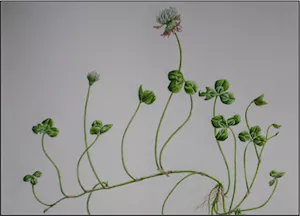
Antiherbivore defenses alter natural selection on plant reproductive traits
Shakespeare taught us that love and enmity are intricately entwined. M.Sc. student Ken Thompson (Johnson Lab) is the latest recipient of the First Paper Award, and his research exemplifies this Shakespearean lesson. Ken just published “Antiherbivore defenses alter natural selection on plant reproductive traits” in Evolution, which is the first lead authored paper from his thesis. His paper provides the first evidence that investment in plant defenses alters natural selection on plant reproductive traits. Ken’s research uses white clovers as a model for plant defense as they exhibit a Mendelian polymorphism for the production of the poisonous chemical hydrogen cyanide. Ken discovered that chemically undefended plants experienced selection for longer, narrower petals. By contrast, chemically defended plants experienced strong selection for shorter, wider petals and more flowers per inflorescence. These results imply that the evolution of defence against enemies alter the evolution of plant reproductive traits. For clovers, the outcome of love depends on whether or not they can poison their enemies.
Congratulations, Ken, on your first M.Sc. paper!
